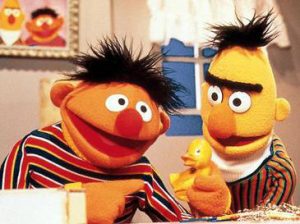“We can’t know whether Bluey will one day go the woke way of Peppa,” The Gospel Coalition’s Brett McCracken wrote two years ago in response to the cartoon Peppa Pig introducing “a character with ‘two mummies.’”
According to McCracken, “Pressure is immense and relentless for even the most innocent children’s entertainment to advance progressive narratives.”
Bluey is a cartoon on Disney+ that shows a family of dogs living together in Queensland.

Brett McCracken
According to McCracken, one of the evidences Bluey is good is that it contrasts “masculine, axe-wielding dads” with “precocious, hard-bargaining daughters” who paint fingernails and toenails due to “the show’s insistence on gender differences.”
But he warned: “Time will tell as to whether Bluey will cower to such demands and incorporate queer canines into its storylines. But for now, we can commend the show for its beautiful depictions of traditional family structures and joyful celebration of childhood, motherhood, fatherhood and the ways in which each distinct role interacts in a beautiful dance, according to an ingenious design.”
According to some conservatives, McCracken’s worst fears have come true and Bluey has gone the woke way of Peppa.
“We’re playing checkers with those who are playing chess, and we’ve been checkmated over and over again,” author Jeremy Pryor wrote in a 2023 piece that was republished this week by The Blaze. “We need to get into the details of the beautiful biblical balancing of the life-giving presence of motherhood and the training, territory expanding and leadership of fatherhood.”

Bert and Ernie on “Sesame Street”
Evangelical conservatives fearing leftist indoctrination in children’s programming is nothing new. Similar fears have been raised in the past about everything from Sesame Street to Teletubbies to a wide range of Disney characters.
So what exactly is Bluey’s blasphemy?
Pryor contends Bandit, Bluey’s father, “embodies almost all of the elements of the traditional mother, purged of the essence of elements from the historic father. … The dad, Bandit, is seen as a constantly nurturing, always-present playmate to his two daughters, Bluey and Bingo. He’s so present, in fact, that fans of the show often joke about when Bandit finds time to work, and in the show, it’s clear that the mother has less time to play than the dad.”
Even worse, according to Pryor, Bandit’s presence with his kids “provides freedom for the mother to get out in the world and explore her individual passions.”
Women being free to explore their passions? Oh, the indoctrination!
Thankfully, the piece has been getting pushback, not from the chess playing “woke mob,” but from other Christians.
“Why does conservative Christian media have to be so effing horrible? Nothing broadly wholesome they won’t crap on as too woke or subversive of biblical standards. These people,” sociologist Samuel Perry lamented. “I mean what the heck is wrong with these miserable people? I hear conservative Christians ‘just want to build beautiful things and mind their own business’ and it’s just a patent lie. It’s full-time culture-warring. If you’re not complaining it’s cuz you’re part of ‘the regime.’”
“Nothing broadly wholesome they won’t crap on as too woke or subversive of biblical standards.”
Zach Lambert, pastor of Restore Austin, added, “What an indictment of toxic Christian masculinity that the presence of a kind and nurturing father is decried as too feminine.”
“Bluey!?” Pastor Kevin Young exclaimed. “They’ve gone too far. I’ll fight them on this.”
And Religion News Service’s Bob Smietana joked, “Teletubbies!!” while noting, “The writer of that piece says that maybe 1% of readers may agree with him.”
Men must rule over women, children and Jesus
Unfortunately, in today’s culture of authoritarian Christianity, Pryor’s belief that “maybe less than 1%” agree with him is a bit naive.
Pryor’s views of the family are exactly in line with what many conservative Christians believe, including the GOP’s vice presidential candidate JD Vance. In an earlier piece for The Blaze, Pryor supported Vance’s demonization of “childless cat ladies” and politicians who don’t have kids. He argued, “If you want to rule over us, we have a right to know why you chose not to make the sacrifices required to raise a family.”
He claims those who object to JD Vance’s claims about childless politicians care more about a “perception of fairness” than “fitness for leadership” and argues that those who have never ruled over a household should not be allowed to rule over millions of households.
To men like Vance and Pryor, society is a created order of hierarchical relationships where someone at the top of government and the home rules over those below. Because these hierarchies promote women making food in the kitchen and babies on the bed, this means men ruling over women and children and being free to explore their passions, while women are kept quiet and busy.
But ironically, it also means these Christian nationalist men would rule over Jesus too. When building his case against childless people being elected to public office, Pryor bases his arguments on the qualifications of an elder in 1 Timothy 3:12.
“I would answer yes, Paul and Jesus are not appropriate candidates for these two positions.”
“Does this mean that single people are not able to hold these positions? Does this make a childless person — like the Apostle Paul, who wrote these statements, or Jesus Christ, who was celibate and single — unqualified to sit on a council of elders?” Pryor asks. “I would answer yes, Paul and Jesus are not appropriate candidates for these two positions.”
In other words, these men have developed a theology where Jesus himself is biblically unqualified to be a politician or even a pastor. So in their society and church, Jesus would have to submit to their authority.
Trigger warning: I’m a stay at home dad
Pryor tells his readers, “Feel free to stop reading if you’re getting triggered.” So it’s probably fair for me to offer a trigger warning to men like Pryor and Vance.

Bluey with dad, Bandit.
I’m a stay at home dad. And given how much there is to do around the house, many people wonder how I find time to write. So in a sense, I’m a lot like Bluey’s dad, Bandit.
I tried being the “primary breadwinner” in our home while leading worship in our church for 20 years. But I spent two decades barely scraping by, while wearing my body down and eventually getting stress-induced shingles at age 35. My wife had to go through three pregnancies and drive our five kids around South Carolina with no air conditioning.
While I was very good at what I did both for the church and work, I knew we needed to make a change. The passion I wanted to explore was in writing about religion and serving the church. But when I applied for jobs either at churches or in other career fields, nobody took my resume seriously because I had been in volunteer roles at the church and in the cleaning industry for work.
The shame I felt from not providing for my family was overwhelming. As a result of seeing my family struggle for so many years, I felt like a failure as a provider and a leader, which in my theology felt like being a failure as a man. I also was much more comfortable on a stage than talking face to face with people.
So while I could speak with ease about theology and spirituality on stage, it felt very unnatural to do so one on one. Rather than learning more about myself and how I’m wired, it led to even more insecurity that perhaps I was a hypocrite, being one way in public and another way in private.
While I was in theory the leader of my wife and kids, I didn’t like to function in that way. Dynamics of dominion and ruling over didn’t resonate with me at all. But presence with and working together for mutual wholeness did. And in my theology, that meant I was abdicating my responsibility as their head, which led to even more shame.
I was trying to fit the mold of biblical manhood, but it was compounding shame upon shame and driving me and my family into the ground.
Maximizing fruitfulness to subdue and rule or to love
According to Pryor’s critique of Bluey, “God created the concept of male and female to create the kind of family that would maximize fruitfulness and multiplication and that over generations of collective effort would subdue and rule the created order.”
Any talk of “the created order,” especially when paired with verbs like “subdue and rule” regarding topics of male and female roles, is hierarchy. And hierarchy always produces dehumanization for those below and exile for those on the outside. Those below are dehumanized because their identity becomes subservient to the “individual passions” of those above. And those who won’t fit into the hierarchy are considered a threat because they present an alternate way of being in the world outside of the tower.

Bluey
This is why Bluey is considered a threat. As Pryor notes, “Creating a daughter named Bluey using the color blue is totally lost on us. It goes right past our conscious awareness. If we do think about it, we think it’s cool that they’re reversing the gender stereotype of colors.”
Additionally, in Bluey, even though the family includes a father and a mother, they don’t function in a way that depicts the mother serving the father’s pursuit of his passions. The relationships are much more face to face, side to side, or together with toys on the ground. Rather than maximizing the fruitfulness of a father’s rule over all, it’s about the entire family valuing and investing in one another.
Eventually, we deconstructed our theology of male headship and embraced a theology of loving one another as self. This meant working together to help everyone in the family pursue their passions. And as a result, the compounding shame completely disappeared and we all became free to pursue our passions.
A couple years later, we wondered if perhaps Ruth Ellen could make more money with her interior design degree than I could given my inadequate resume.
So we scrapped our roles and did what was best for our family.
Now I spend my day cooking, washing dishes, cleaning bathrooms, watering flowers, folding laundry and hanging out with my five kids, while waiting for Ruth Ellen to come home from work.
As I’m working on those activities, I’m free to listen to audiobooks or podcasts that help inform my writing. That’s led to a career in writing for Baptist News Global and signing a book deal with Broadleaf Books that I never could have dreamed of before.
“This is about being healthy humans who love our neighbors as ourselves.”
This isn’t about being woke or thinking it’s cool to reverse gender color stereotypes. It’s about being healthy humans who love our neighbors as ourselves. Maybe if these guys studied the Sermon on the Mount, they could connect those dots. But unfortunately, they’re too busy making arguments that Jesus would have to submit to them since he’s “biblically unqualified.”
Bluey manhood vs. ‘biblical manhood’
Pryor claims, “Since we’re focusing here on fatherhood, the most important person comes when we meet a man named Abram.” He says that Abram in Genesis means “Exalted Father” and Abram was “the meta father.”

Jeremy Pryor
By making the most important father figure an ancient Near Eastern patriarch, Pryor sacralizes for all eternity the culture of ancient Near Eastern patriarchy. And thus, because today’s kid’s cartoon Bluey doesn’t uphold ancient Near Eastern patriarchy, it must be exposed as a threat.
In a follow-up piece published on his Substack, Pryor added some additional thoughts about Bluey and biblical fatherhood and included a list of nine contrasts between Bluey manhood and “biblical” manhood. According to Pryor:
- Bandit wants to play with kids. Abraham wants to train his kids.
- Bandit wants to submit to the vision of his children. Abraham wants to sweep his kids into a greater family vision.
- Bandit wants to maximize time with his kids when they are children. Abraham wants to maximize time with his kids when they are adults.
- Bandit’s primary domain of fatherhood is with young children in the home. Abraham expresses fatherhood by multiplying the resources of family through work.
- Bandit wants to experience being his kid’s play toy. Abraham wants his kids to respect him, honor him and obey his voice.
- Bandit wants to spend time in his kid’s made-up world. Abraham wants his kids to spend time with him in his adult world.
- Bandit wants to maximize present fun. Abraham wants to maximize future impact.
- Bandit represents the peak of fatherhood with young children in the home. Abraham sees peak fatherhood as being a grandfather or great-grandfather surrounded by generations of his children.
- Bandit sees the father ideally as meeting the emotional desires of a small number of kids. Abraham sees fatherhood ideally as leading an ever-growing dynamic team.
The end game
As JD Vance debated Tim Walz, one of the most common appeals he made was to “common sense.” After the debate was finished, his supporters presented him as a calm, reasoned promoter of common sense. Maybe Trump slips into bombastic bloviating on occasion, but Vance is cool, calm and collected.
Similarly, men like Pryor present their theology as basic biblical Christianity, as if it’s a totally reasonable recipe for human flourishing. They, too, want to appear calm and rational in handing out their prescriptions.
But if you take a step back and notice what would happen if they got their way, you’ll realize what’s going on here.
In their world, my family would lose our house because Ruth Ellen would quit her job and I would go back to scraping by to make ends meet. I’d have to stop writing about what these men are doing and the theologies they use to justify their actions. Neither of us would be able to pursue our passions. And I would have to adopt a model of manhood that simply doesn’t resonate with me at all and that would alienate me from my family by suddenly making myself their lord.
In their world, my family’s story would be multiplied over and over again throughout the entire nation. As Al Mohler argued, our “No. 1 national priority” and our “first civilizational responsibility” would be men putting women in their kitchen and on their beds so the men could pursue their dreams, which Pryor says would include being surrounded by an ever-growing dynamic team of children who respect, honor and obey them.
And ironically, in their world, when Jesus returns, he would have to submit to these men, too, alongside the women and children since he’s biblically unqualified to be a politician or pastor.
So the end game is that men like Vance and Pryor would be in charge of their homes, their governments and even of their god.
It’s no wonder that men with such a power trip would feel insecure enough to publish articles against Bluey for disobeying their “gender stereotype of colors.”
In patriarchy, grown men are threatened by cartoons.

Rick Pidcock
Rick Pidcock is a 2004 graduate of Bob Jones University, with a bachelor of arts degree in Bible. He’s a freelance writer based in South Carolina and a former Clemons Fellow with BNG. He completed a master of arts degree in worship from Northern Seminary. He is a stay-at-home father of five children and produces music under the artist name Provoke Wonder. Follow his blog at www.rickpidcock.com.


